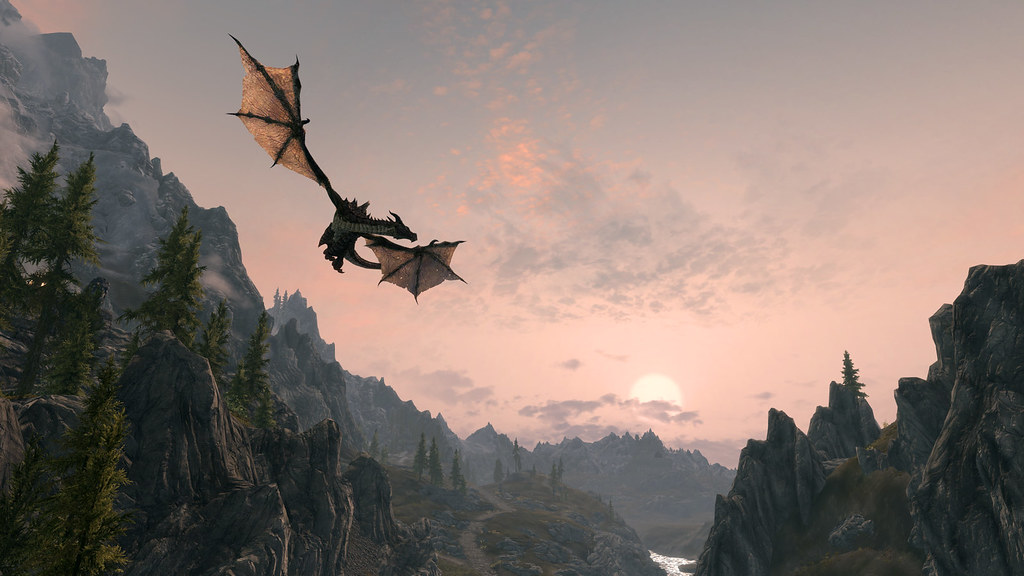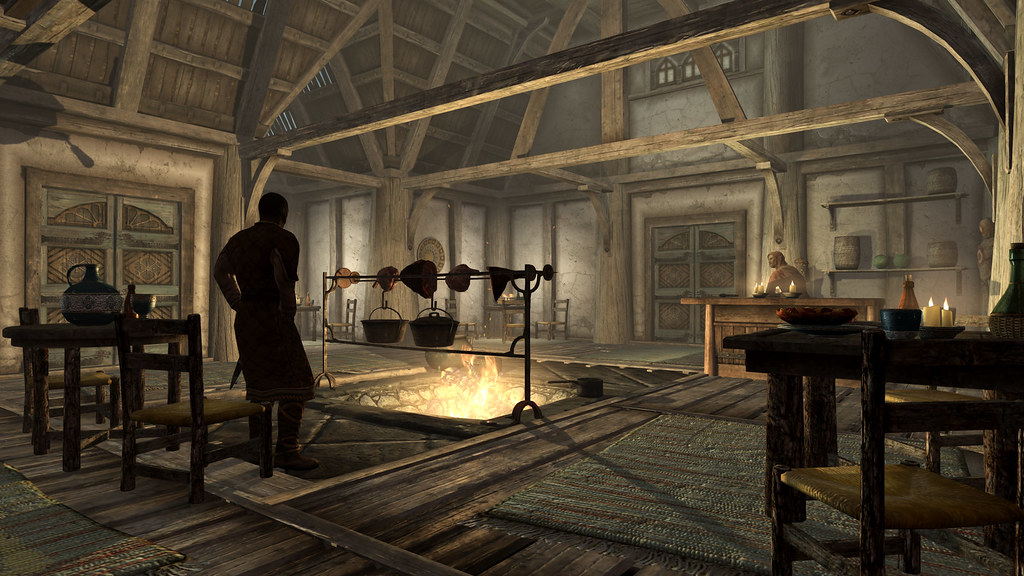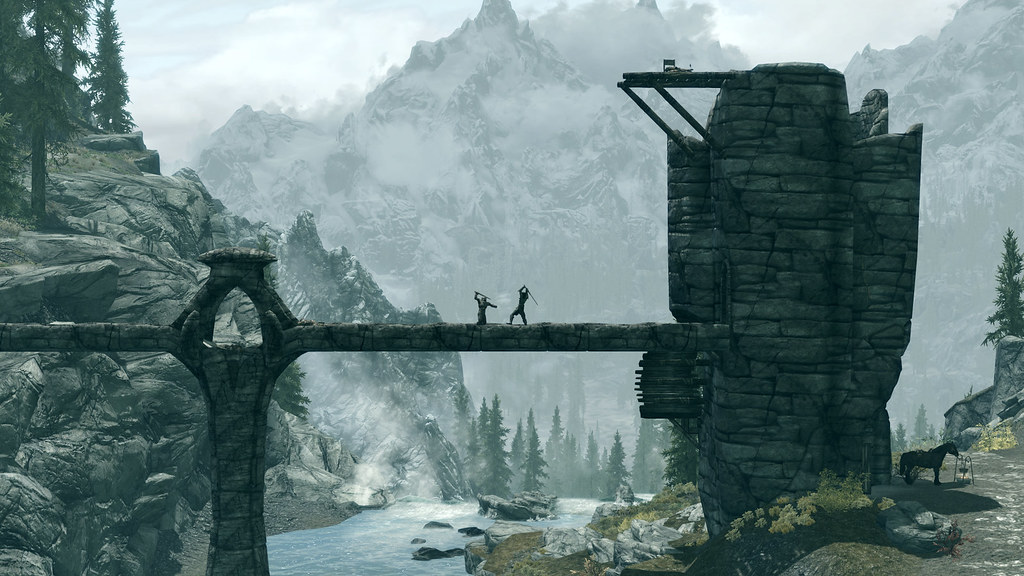Earlier this week I discussed how The Elder Scrolls V: Skyrim feels like a game about travel. Since then, I've explored and played a bit more, and I've learned a few new things.
First, though, check out this site and the absolutely, mouth-wateringly gorgeous shots they've published of the game running on bumped-up, top-shelf PC settings (I have the bog-standard Xbox 360 version).
Dead End Thrills: Skyrim++
Done yet? Ok, pick your jaw up off the floor and let's press on forwards. At this point, I've explored a bit more of Skyrim's forty square miles. It's important to know that Skyrim does contain a bit of the Coastline Paradox - the scope of the map is greatly increased by its wrinkliness. As any hiker knows, 10 miles over rough terrain is a lot more than 10 miles across a flat plain.
So, like any good traveler, I've picked up a lot of souvenirs. They range from the mundane (soup, cheese, butterfly wings) to the wildly exotic (fragments of ancient cursed amulets, dragon scales). One of the most engrossing bits of Skyrim is actually manual labour, though.
Dotted across the landscape are mines that you can delve into - some are filled with wights and bandits, while others are functioning bits of the local economies. You can dip into these at any time and mine ore away to your heart's content (OK, well, 'Press A to Mine' sort of thing). Different mines hold different ores, from iron to quicksilver to exotic materials like 'moonstone' and malachite. Carry these ores back to a smith's facilities, and you can smelt and forge them into ingots and then actual weapons and armor.
It's all pretty abstracted - you just select what you're making from a menu and the game spits out the finished product based on your skill numbers - but it's enough to create a sense of ownership around the goods. Then comes the good bit ... enchantments.
Any RPG player worth his or her salt (something you can also find in the game) knows that enchanted items are always best(unless they're cursed and steal your soul). Skyrim offers plenty of these, but it also gives you the ability to smash and dissect any magical item you like, learning its secrets in the process. Once learned, you can imbue any item you like with a selection of these learned enchantments, as long as you have a soulstone with a trapped soul inside.
This all ties perfectly with Skyrim's tourism-encouraging ways. You can and will fight and defeat an undead king in a forgotten ruin, trap his soul in a gem, steal his flaming sword and use its secrets to give the Elvish bow you crafted with your own hands arcane powers. It's a relatively subtle touch compared to fire-breathing dragons, and none of it is too complicated (Press A), but it creates a sense of ownership and history with your gear. In addition, you get to name your own enchanted items, which lets your imagination run wild - right now, my Breton archer-mage is rocking the bow Death's Arc, the Elvish armor Cloak of Shadows, the Helm of Thought and a bunch of other custom-made gear.
It's the fantasy RPG equivalent of a bespoke Savile Row suit...and it's awesome.
First, though, check out this site and the absolutely, mouth-wateringly gorgeous shots they've published of the game running on bumped-up, top-shelf PC settings (I have the bog-standard Xbox 360 version).
Dead End Thrills: Skyrim++
 |
| Here be dragons. Lovely, lovely dragons. |
So, like any good traveler, I've picked up a lot of souvenirs. They range from the mundane (soup, cheese, butterfly wings) to the wildly exotic (fragments of ancient cursed amulets, dragon scales). One of the most engrossing bits of Skyrim is actually manual labour, though.
Dotted across the landscape are mines that you can delve into - some are filled with wights and bandits, while others are functioning bits of the local economies. You can dip into these at any time and mine ore away to your heart's content (OK, well, 'Press A to Mine' sort of thing). Different mines hold different ores, from iron to quicksilver to exotic materials like 'moonstone' and malachite. Carry these ores back to a smith's facilities, and you can smelt and forge them into ingots and then actual weapons and armor.
 |
| Baking a tasty mammoth steak. |
Any RPG player worth his or her salt (something you can also find in the game) knows that enchanted items are always best(unless they're cursed and steal your soul). Skyrim offers plenty of these, but it also gives you the ability to smash and dissect any magical item you like, learning its secrets in the process. Once learned, you can imbue any item you like with a selection of these learned enchantments, as long as you have a soulstone with a trapped soul inside.
This all ties perfectly with Skyrim's tourism-encouraging ways. You can and will fight and defeat an undead king in a forgotten ruin, trap his soul in a gem, steal his flaming sword and use its secrets to give the Elvish bow you crafted with your own hands arcane powers. It's a relatively subtle touch compared to fire-breathing dragons, and none of it is too complicated (Press A), but it creates a sense of ownership and history with your gear. In addition, you get to name your own enchanted items, which lets your imagination run wild - right now, my Breton archer-mage is rocking the bow Death's Arc, the Elvish armor Cloak of Shadows, the Helm of Thought and a bunch of other custom-made gear.
 |
| Sir Ian, Sir Ian, Sir Ian...WIZARD THOU SHALT NOT PASS...Sir Ian |









